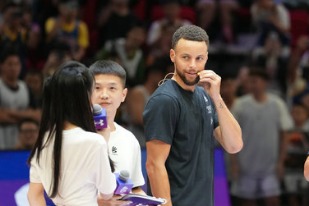Why aren't people celebrating greater diversity in beauty, art?

Art, fashion and beauty standards have a long history of controversy, from the bikini to Lady Gaga's meat dress; from Michelangelo's The Last Judgment to Banksy's self-destructing Girl With Balloon and from Twiggy's waifish appearance to South Korea's cosmetic surgery industry. One of the latest to cause an uproar is a two-year-old advertisement by Chinese snack company Three Squirrels in which they used a Chinese model with what some are calling "overly slanted eyes".There's also been a recent animated film release with an inspiring storyline, in which three boys strive to become lion dancers-but instead of taking away the inspiration, some have called out the shape of the cartoon characters' eyes.
The definition of art is "the expression or application of human creative skill and imagination, typically in a visual form, such as painting or sculpture, producing works to be appreciated primarily for their beauty or emotional power". Art can be interpreted in many different ways, in which no opinion is considered "true". The makers of the animated film have stood their ground, shown cultural confidence and stated that they have "deliberately tried to keep a distance from the kind of beauty typical to an online celebrity or the effect produced by a mobile phone filter".
The model in the Three Squirrels advert has responded to the negative comments by stating that people have created big problems out of trivial things and it has become a morbid obsession. She goes on to ask, "With small eyes, am I not Chinese?" I can only imagine the frustration anyone who works as a model would feel when being criticized for something they are born with. If one were to look at average people on the street, not everyone has large eyes with double eyelids. Everyone is different. And that's a beautiful thing.
As a Westerner of Asian ethnicity, I grew up surrounded by people's perceived stereotypes of Asians. As an Asian female who grew up in the West in a Caucasian family engulfed by a Caucasian community, I was brought up to believe that Asian stereotypes centered on flawless milky-white skin, almond-shaped brown eyes, tiny bodies and long, silky black hair. Other than the tiny body, I didn't fit the Western stereotype. In the summers I was deeply tanned, my hair was like a rat's nest and I had freckles on my cheeks that made me self-conscious. I felt like I was the only one until Lucy Liu became famous and makeup artists did nothing to cover up these adorable little spots.
One art form that pushed these stereotypes of Asians in the West is film. An example is The Good Earth, a film from 1937 in which German actress Luise Rainier played the lead role of a Chinese woman. She was chosen over Asian American actress Anna May Wong due to the Hays Code, which, at the time, would not allow an Asian and a Caucasian to play husband and wife on screen.
The 1993 drama The Joy Luck Club is filled with an ethnically Asian cast. While it portrays many of its characters to be spiritually strong, it too sends the message that Asians are only one type. Because of this small amount of representation in the West, it wasn't until I actually lived in, and traveled around, Asia that I saw for myself that the people come in many different ethnicities. China alone has 56 very different official ethnic groups which bear features of all shapes and sizes, with different hair textures and skin colors. This should be something to appreciate.
For years people have been calling for more diversity. When it is offered, it seems many fight against it. How boring would life be if adverts or art showed everything to be "one type only"? If you visit the Miss Korea pageant website, you'll see numerous photographs of young women who could all be sisters. If artists and companies are being accused of pandering to Western stereotypes, then why are millions rushing to get double eyelid surgery and wearing colored contacts, and risking their lives for bleached skin? How much backlash would there be if advertisements started using Asian models, but only ones that looked more American, or did the hair and makeup of Asian models to make them look more European?
Art should represent all people and all ethnicities. It's always refreshing to see art capturing something other than the typical fashion model. It's been proved that advertising campaigns can damage the self-image of young girls and women by constantly pushing unrealistic standards of beauty. With social media being at the forefront of "communication", people have access to seemingly infinite information and images that can be damaging to one's mental health.
We (all people) should feel proud when everyone is represented-not just thin, white, with big eyes and perfect hair.
I remember when Dove Skincare started using "real" women in their "real beauty" campaign and it was such a relief to see a variety of bodies that were big, small, light and dark.
One of the things I love about China and the rest of Asia is the diversity in ethnicity, appearance and culture. If it can be showcased through art for the rest of the world to learn about and appreciate, shouldn't we celebrate it?
Contact the writer at schroeder@chinadaily.com.cn





































